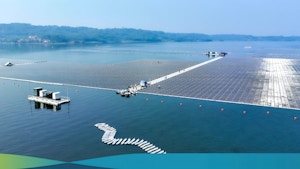Latest Stories

Floating solar deals, cross-border energy plans and a new carbon credit framework highlight early progress, but achieving net zero will require rapid capacity expansion and a more resilient, modernised grid.

SDG 13. Climate
Asean must connect energy planning with environmental protection: Philippines energy director
As the Philippines gears up to chair Asean next year, Michael Sinocruz says the government will push offshore wind to bolster cross-border renewable energy trade, while protecting marine life impacted by infrastructure.

The city-state will generate no more than 10 per cent of its energy from solar by 2050, and is exploring geothermal, biomethane and regional energy-sharing to decarbonise, Singapore's energy minister said. The country is also planning a "low-carbon" data centre park – its first since a moratorium on data centres ended in 2022.

SDG 13. Climate
Southeast Asian banks need to end loopholes allowing finance for industrial coal power
If they are serious about a sustainable future, they must close loopholes and extend coal policies across clients’ entire value chains, denying new financing to companies using coal unless they have credible, time-bound clean energy plans.
On Asia Pacific

This year, ‘greenrinsing’ – shifting climate targets after luring investment – cast a shadow over corporate decarbonisation efforts, while fossil fuel firms leaned on carbon capture technologies to justify ongoing expansion and promoted natural gas as "clean".

Over 70 per cent of organisations are investing more than 10 per cent of their capital expenditure in low-carbon initiatives as digitalisation and automation take centre stage.

Floating solar deals, cross-border energy plans and a new carbon credit framework highlight early progress, but achieving net zero will require rapid capacity expansion and a more resilient, modernised grid.

SDG 13. Climate
Indonesia’s energy transition could be turbocharged by Chinese green finance, study finds
Redirecting the energy funding Indonesia receives from China entirely into renewables could mobilise up to US$9 billion over the next decade. But enabling Chinese investment will require stronger industrial policies, a study finds.
Further Reading
Translated Stories



























![Hanoi air con [Tagalog]](https://eco-business.imgix.net/ebmedia/fileuploads/hanoi_air_con_2qhgp6p.jpg?ar=16%3A9&auto=format&fit=crop&ixlib=django-1.2.0&q=85&width=300)





![[Bahasa] The Ulubelu geothermal project in Lampung on Sumatra Island](https://eco-business.imgix.net/ebmedia/fileuploads/Ulubelu_geothermal_project.jpeg?ar=16%3A9&auto=format&fit=crop&ixlib=django-1.2.0&q=85&width=300)
![[Bahasa] Do Asian consumers care how clean energy is - as long as its cheap?](https://eco-business.imgix.net/ebmedia/fileuploads/48603940537_4734527f2e_o.jpeg?ar=16%3A9&auto=format&fit=crop&ixlib=django-1.2.0&q=85&width=300)

![[Tagalog] A coal plant in Indonesia. Southeast Asia's largest country by population and economy is the region's only region to be building new coal plants in 2019.](https://eco-business.imgix.net/ebmedia/fileuploads/PaitonPLTU_jeracojp_0xhp96R.jpg?ar=16%3A9&auto=format&fit=crop&ixlib=django-1.2.0&q=85&width=300)
![[Vietnamese] Wind Power Farm](https://eco-business.imgix.net/ebmedia/fileuploads/1280px-Bac_Lieu_windpower_farm.jpg?ar=16%3A9&auto=format&fit=crop&ixlib=django-1.2.0&q=85&width=300)
![[Vietnamese] Dau Tieng Solar Power Project, Vietnam](https://eco-business.imgix.net/ebmedia/fileuploads/DAU_TIENG_1-2-3_PM1MRQW.png?ar=16%3A9&auto=format&fit=crop&ixlib=django-1.2.0&q=85&width=300)
![[Tagalog] electric jeepneys](https://eco-business.imgix.net/ebmedia/fileuploads/65110412_877836225910237_4923067629809172480_o_pUIswTn.jpg?ar=16%3A9&auto=format&fit=crop&ixlib=django-1.2.0&q=85&width=300)
![[Tagalog] PH Floating Solar Test Bed Panels](https://eco-business.imgix.net/ebmedia/fileuploads/Bay_Floating_Solar_-_Basketball_Court_Background_JvX32Wb.jpg?ar=16%3A9&auto=format&fit=crop&ixlib=django-1.2.0&q=85&width=300)
![[Bahasa Indonesian] Masks and Pollution](https://eco-business.imgix.net/ebmedia/fileuploads/8371262254_7286c862a9_o_INgTQlx.jpg?ar=16%3A9&auto=format&fit=crop&ixlib=django-1.2.0&q=85&width=300)
![[Bahasa Indonesia] aerial image telunas](https://eco-business.imgix.net/ebmedia/fileuploads/Aerial_view_WMugNFT.jpg?ar=16%3A9&auto=format&fit=crop&ixlib=django-1.2.0&q=85&width=300)
![[Bahasa Indonesian] Pagbilao coal plant](https://eco-business.imgix.net/ebmedia/fileuploads/GP01A4D_High_res_61NyDNk.jpg?ar=16%3A9&auto=format&fit=crop&ixlib=django-1.2.0&q=85&width=300)